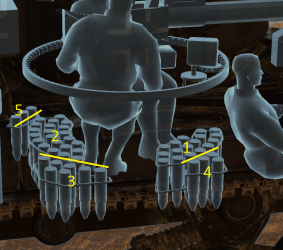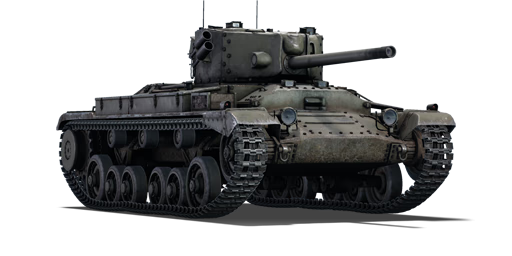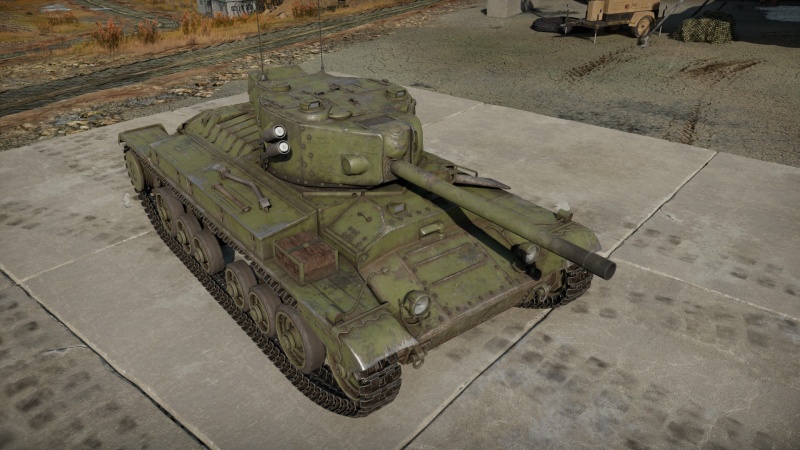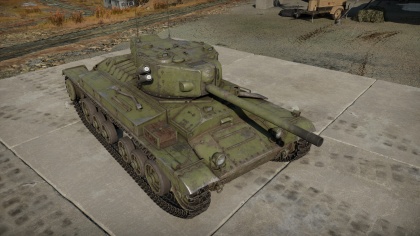Difference between revisions of "MK-IX "Valentine" (USSR)"
Inceptor57 (talk | contribs) (→Usage in battles: Added to the section) |
|||
| Line 1: | Line 1: | ||
| − | {{Specs-Card|code=ussr_valentine_mk_9}} | + | {{Specs-Card |
| + | |code=ussr_valentine_mk_9 | ||
| + | |images={{Specs-Card-Image|GarageImage_{{PAGENAME}}.jpg}} | ||
| + | }} | ||
== Description == | == Description == | ||
| Line 9: | Line 12: | ||
== General info == | == General info == | ||
=== Survivability and armour === | === Survivability and armour === | ||
| + | {{Specs-Tank-Armour}} | ||
<!--Describe armour protection. Note the most well protected and key weak areas. Appreciate the layout of modules as well as the number and location of crew members. Is the level of armour protection sufficient, is the placement of modules helpful for survival in combat? If necessary use a visual template to indicate the most secure and weak zones of the armour.--> | <!--Describe armour protection. Note the most well protected and key weak areas. Appreciate the layout of modules as well as the number and location of crew members. Is the level of armour protection sufficient, is the placement of modules helpful for survival in combat? If necessary use a visual template to indicate the most secure and weak zones of the armour.--> | ||
| Line 36: | Line 40: | ||
=== Mobility === | === Mobility === | ||
| + | {{Specs-Tank-Mobility}} | ||
<!-- ''Write about the mobility of the ground vehicle. Estimate the specific power and manoeuvrability, as well as the maximum speed forwards and backwards.'' --> | <!-- ''Write about the mobility of the ground vehicle. Estimate the specific power and manoeuvrability, as well as the maximum speed forwards and backwards.'' --> | ||
{{tankMobility|abMinHp=256|rbMinHp=146}} | {{tankMobility|abMinHp=256|rbMinHp=146}} | ||
| + | |||
| + | === Modifications and economy === | ||
| + | {{Specs-Economy}} | ||
== Armaments == | == Armaments == | ||
| + | {{Specs-Tank-Armaments}} | ||
=== Main armament === | === Main armament === | ||
| + | {{Specs-Tank-Weapon|1}} | ||
<!-- ''Give the reader information about the characteristics of the main gun. Assess its effectiveness in a battle based on the reloading speed, ballistics and the power of shells. Do not forget about the flexibility of the fire, that is how quickly the cannon can be aimed at the target, open fire on it and aim at another enemy. Add a link to the main article on the gun: <code><nowiki>{{main|Name of the weapon}}</nowiki></code>. Describe in general terms the ammunition available for the main gun. Give advice on how to use them and how to fill the ammunition storage.'' --> | <!-- ''Give the reader information about the characteristics of the main gun. Assess its effectiveness in a battle based on the reloading speed, ballistics and the power of shells. Do not forget about the flexibility of the fire, that is how quickly the cannon can be aimed at the target, open fire on it and aim at another enemy. Add a link to the main article on the gun: <code><nowiki>{{main|Name of the weapon}}</nowiki></code>. Describe in general terms the ammunition available for the main gun. Give advice on how to use them and how to fill the ammunition storage.'' --> | ||
{{main|6pdr OQF Mk.III (57 mm)}} | {{main|6pdr OQF Mk.III (57 mm)}} | ||
Revision as of 09:47, 28 December 2020
Contents
Description
The ▂МК-IX "Valentine" is a premium gift rank II Soviet medium tank
with a battle rating of 3.0 (AB/RB/SB). It was introduced during Update 1.95 "Northern Wind" as a special Valentines' Day vehicle. This is a Lend-Lease Valentine, shipped to the USSR by British.
General info
Survivability and armour
The armour on the MK-IX "Valentine" is quite mediocre. The maximum base armour thickness of the hull is 60 mm and is laid out flat on the designs, while the sloping portions are of thinner 30 mm armour plates. This gives an average thickness of ~60 mm of armour when facing the MK-IX "Valentine" from the front. The turret is more well protected than the hull, with its front armoured with 65 mm armour plates and sloped with its circular shape, but the cast construction of the gun mantlet can lead to some enemies attacking the gun breech to disable the Valentine's firepower, if they do not aim for the hull directly.
The mediocre armour construction means that there will be multiple types of enemies the MK-IX "Valentine" can encounter that can easily penetrate through the armour, especially if the opponent is firing at a close range and have a good knowledge on the MK-IX "Valentine"'s weak spots. These armour vulnerabilities adds up with the Valentine's fault of not being a particularly fast vehicle. This means any exposure from cover can be a long one that enemies can take the time to line up their next shot towards an armour weak point.
Armour type:
- Rolled homogenous armour (Hull, Turret)
- Cast homogenous armour (Gun mantlet)
| Armour | Front (Slope angle) | Sides | Rear | Roof |
|---|---|---|---|---|
| Hull | 60 mm (1°) Front plate 30 mm (65-67°) Front glacis 60 mm (24°) Lower glacis |
50 mm | 17 mm (51-54°) Top 60 mm (1°) Bottom |
20 mm (40-89°) |
| Turret | 65 mm (0-73°) Turret front 65 mm (1-61°) Gun mantlet |
60 mm (0-1°) | 65 mm (2-58°) | 20 mm (76-89°) |
Notes:
- Belly armour is 20 mm thick.
- Suspension wheels, bogies, and tracks are all 20 mm thick.
Mobility
| Game Mode | Max Speed (km/h) | Weight (tons) | Engine power (horsepower) | Power-to-weight ratio (hp/ton) | |||
|---|---|---|---|---|---|---|---|
| Forward | Reverse | Stock | Upgraded | Stock | Upgraded | ||
| Arcade | 27 | 4 | 17.3 | 256 | 315 | 14.8 | 18.21 |
| Realistic | 25 | 3 | 146 | 165 | 8.44 | 9.54 | |
Modifications and economy
Armaments
Main armament
| 57 mm 6pdr OQF Mk.III | Turret rotation speed (°/s) | Reloading rate (seconds) | |||||||||||
|---|---|---|---|---|---|---|---|---|---|---|---|---|---|
| Mode | Capacity | Vertical | Horizontal | Stabilizer | Stock | Upgraded | Full | Expert | Aced | Stock | Full | Expert | Aced |
| Arcade | 53 | -12°/+20° | ±180° | N/A | 15.23 | 21.08 | 25.60 | 28.31 | 30.12 | 5.20 | 4.60 | 4.24 | 4.00 |
| Realistic | 9.52 | 11.20 | 13.60 | 15.04 | 16.00 | ||||||||
Ammunition
| Penetration statistics | |||||||
|---|---|---|---|---|---|---|---|
| Ammunition | Type of warhead |
Penetration @ 0° Angle of Attack (mm) | |||||
| 10 m | 100 m | 500 m | 1,000 m | 1,500 m | 2,000 m | ||
| Shot Mk.5 | AP | 101 | 97 | 82 | 66 | 53 | 43 |
| Shot Mk.5 HV | AP | 108 | 104 | 87 | 70 | 57 | 46 |
| Shot Mk.8 | APC | 110 | 106 | 89 | 72 | 59 | 48 |
| Shot Mk.9 | APCBC | 122 | 118 | 101 | 84 | 70 | 58 |
| Shell Mk.10 | HE | 9 | 9 | 9 | 9 | 9 | 9 |
| Shell details | ||||||||||
|---|---|---|---|---|---|---|---|---|---|---|
| Ammunition | Type of warhead |
Velocity (m/s) |
Projectile Mass (kg) |
Fuse delay (m) |
Fuse sensitivity (mm) |
Explosive Mass (TNT equivalent) (g) |
Normalisation at 30° from horizontal |
Ricochet | ||
| 0% | 50% | 100% | ||||||||
| Shot Mk.5 | AP | 815 | 2.8 | N/A | N/A | N/A | -1.0° | 47° | 60° | 65° |
| Shot Mk.5 HV | AP | 853 | 2.8 | N/A | N/A | N/A | -1.0° | 47° | 60° | 65° |
| Shot Mk.8 | APC | 853 | 2.87 | N/A | N/A | N/A | +4.0° | 48° | 63° | 71° |
| Shot Mk.9 | APCBC | 801 | 3.23 | N/A | N/A | N/A | +4.0° | 48° | 63° | 71° |
| Shell Mk.10 | HE | 655 | 2.72 | 0.1 | 0.1 | 590 | +0.0° | 79° | 80° | 81° |
Ammo racks

| Full ammo |
1st rack empty |
2nd rack empty |
3rd rack empty |
4th rack empty |
5th rack empty |
Visual discrepancy |
|---|---|---|---|---|---|---|
| 53 | 43 (+10) | 32 (+21) | 21 (+32) | 11 (+42) | 1 (+52) | No |
Optics
| MK-IX "Valentine" (USSR) Optics | ||
|---|---|---|
| Which ones | Default magnification | Maximum magnification |
| Main Gun optics | x1.85 | x3.5 |
| Comparable optics | M4A1 | |
Usage in battles
The MK-IX Valentine fits in a niche battle rating in the Soviet line-up, presenting its own unique traits compared to the rest of the Soviet line-up. Its armour is a considerable improvement from preceding medium tanks like the T-28. The firepower with the 57 mm gun gives penetration values similar to the tank destroyers like the ZiS-30, along with a faster reloading rate and superior gun depression. However, its mobility is a downgrade compared to anything available to the Soviets, even the ~30 ton heavier KV-1 can move faster than the Valentine on the battlefield. As such, finding a place for the Valentine in the Soviet line-up can be tricky.
The Valentine's excelling role is in a methodical march towards its objective, as its mobility precludes any attempt to make a speedy flanking manouvre. Teammates are more than likely to reach and capture the point before the Valentine will, but this does not mean the Valentine should not participate in the effort.
One must use the Valentine wisely to not expose it too long in the open when traveling to the objective; make the most of any cover available. It is in these periods that the Valentine is most vulnerable to a concealed enemy a distance away taking a shot at the Valentine's armour straight at the front or from the sides. Angling the armour during movement through contested areas is a must as the flat surfaces present easy weak points for any frontal enemy to attack at, and the guns at this rank are more than likely to penetrate even at slightly angled armour plates. Whether uptiered or downtiered, the main concerning enemy unit are tank destroyers, as their guns have a high chance of penetrating the Valentine's armour no matter how the vehicle is angled.
Once a position is taken however, the Valentine can plant itself at the location at suitable firing positions and make use of the fast-firing and potent 57 mm gun to take out any enemy assault units. The green paint on the Valentine can assist in concealment on foliage-rich environment for a good ambush position. Whether from behind cover or a hull-down position, the Valentine can end up victorious in an engagement if it hits with the first shot. However, due to the poor mobility, the Valentine's movement is restricted. This means it is important to make sure the enemy's ability to fire back and/or move is knocked out in the first shot so it is not required to retreat back into cover during the brief reloading period, then out again to fire, especially since that whole manouvre can take more time than simply reloading in place while exposing the tank to return fire. The poor mobility also means the Valentine needs to be aware of any flanking vehicles coming up, as the Valentine would not be able to react fast enough to the new threat.
Modules
| Tier | Mobility | Protection | Firepower | |||
|---|---|---|---|---|---|---|
| I | Tracks | Parts | Horizontal Drive | Shot Mk.5 HV | ||
| II | Suspension | Brake System | FPE | Shot Mk.8 | Adjustment of Fire | |
| III | Filters | Crew Replenishment | Shot Mk.9 | Elevation Mechanism | Smoke grenade | |
| IV | Transmission | Engine | Artillery Support | |||
| This is a premium vehicle: all modifications are unlocked on purchase | ||||||
Pros and cons
Pros:
- 57 mm gun has decent penetration
- Upper glacis is sloped, can bounce a few shots
- Low profile allows it to hide behind obstacles
- Decent stock shells
- Turret is angled and can bounce some shots
- Fast reload speed
Cons:
- No machine gun
- Side armour is very weak
- Slow top speed (22 km/h)
- Drivers port and the area around it is a major weak spot
- No explosive filler in shells
- Only three crew members (crew can be knocked out very easily)
- Thin top armour makes it vulnerable to air attacks
History
- Valentine in the USSR
Some Valentines were sent to the Soviet Union as part of the Lend-Lease program, most of the Valentines came from Canada's production lines. The Valentines saw use from the time of Battle of Moscow in 1941 all the way until the end of the war, though the Valentines saw use more as a second-line tank due to its relative weakness. It was criticized for its slow speed and weak gun but was liked for its small size, reliability, and armour protection and thus the Soviet Supreme Command continue asking for it and its production to continue until the end of the war.
Media
- Skins
- Videos
See also
Links to the articles on the War Thunder Wiki that you think will be useful for the reader, for example:
- reference to the series of the vehicles;
- links to approximate analogues of other nations and research trees.
External links
| USSR medium tanks | |
|---|---|
| T-28 | T-28 (1938) · T-28 · T-28E |
| T-34-76 | T-34 (Prototype) · T-34 (1940) · T-34 (1941) · T-34 (1st Gv.T.Br.) · T-34 (1942) · T-34E STZ · T-34E |
| T-34-57 | T-34-57 · T-34-57 (1943) |
| T-34-85 | T-34-85 (D-5T) · T-34-85 · T-34-85E |
| T-34-100 | T-34-100 |
| T-44 | T-44 · T-44-100 · T-44-122 |
| T-54 | T-54 (1947) · T-54 (1949) · T-54 (1951) |
| T-55 | TO-55 · T-55A · T-55AM-1 · T-55AMD-1 |
| T-62 | T-62 · T-62M-1 |
| T-64 | Object 435 · T-64A (1971) · T-64B |
| T-72 | T-72A · T-72AV (TURMS-T) · T-72B · T-72B (1989) · T-72B3 · T-72M2 Moderna |
| T-80 | T-80B · T-80U · T-80UD · T-80UK · T-80UM2 · Т-80U-Е1 · T-80BVM · Object 292 |
| T-90 | Т-90А · T-90M |
| Trophies/Lend-Lease | |
| Germany | ▂T-III · ▂T-V |
| Great Britain | ▂МК-IX "Valentine" |
| USA | ▂M3 Medium · ▂M4A2 |
| USSR premium ground vehicles | |
|---|---|
| Light tanks | BA-11 · RBT-5 · BT-7A (F-32) · T-26 (1st Gv.T.Br.) · T-26E · T-126 · PT-76-57 · 2S38 |
| Medium tanks | T-34 (Prototype) · T-34 (1st Gv.T.Br.) · T-34E · T-34-57 (1943) · T-34-85E · T-34-100 · T-44-122 · TO-55 · T-55AM-1 · T-72AV (TURMS-T) · T-80UD · Т-80U-Е1 |
| ▂M3 Medium · ▂M4A2 · ▂T-III · ▂T-V · ▂МК-IX "Valentine" | |
| Heavy tanks | SMK · T-35 · ▂MK-II "Matilda" · KV-1E · KV-2 (1940) · KV-2 (ZiS-6) · KV-122 · KV-220 · IS-2 "Revenge" · Object 248 · IS-6 · T-10A |
| Tank destroyers | BM-8-24 · BM-13N · BM-31-12 |
| SU-57 · SU-76D · SU-76M (5th Gv.Kav.Corps) · SU-85A · SU-100Y · SU-122P · Object 120 | |
| SPAA | ▂Phòng không T-34 · ZUT-37 |






